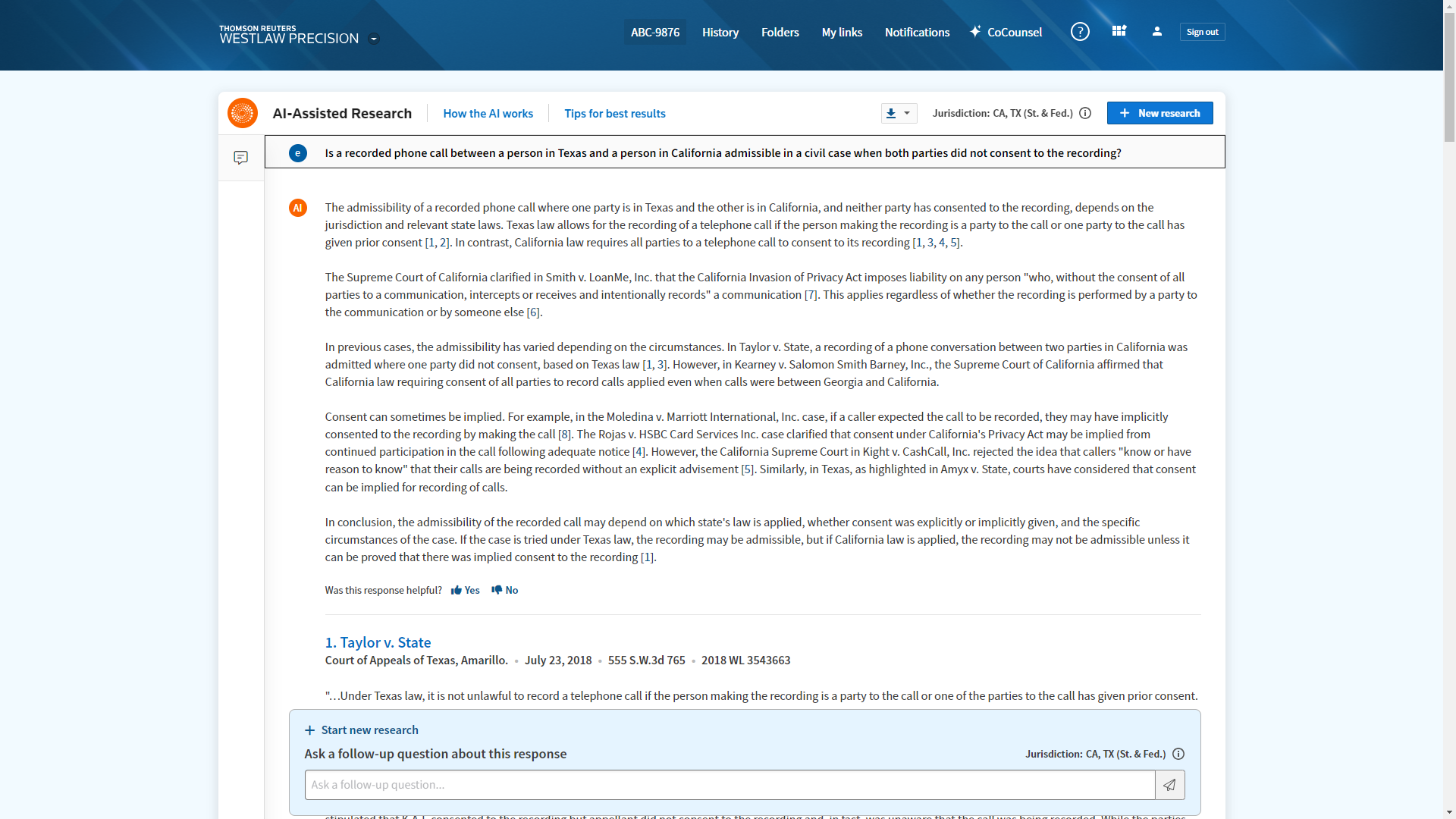Legal Industry Reaction to AI-Assisted Research on Westlaw Precision and the Thomson Reuters Generative AI Strategy

Thomson Reuters provided legal industry journalists a sneak peek of AI-Assisted Research on Westlaw Precision and introduced a series of additional initiatives, including the new generative AI assistant connecting all Thomson Reuters generative AI products, Thomson Reuters Generative AI Platform, generative AI capabilities in Practical Law, and CoCounsel Core.
Legal Current shares perspectives from legal industry journalists and influencers on the Thomson Reuters strategy and product highlights. Several journalists noted the strategic approach Thomson Reuters is taking to integrating generative AI, with the recognition of how the technology can transform the legal profession.
Steve Embry of TechLaw Crossroads was impressed that “the Thomson Reuters presenters offered a consistent and clear vision at the briefing as to where Thomson Reuters wants to go with GenAI.” He noted, “What stood out from Thomson Reuters’ new product announcements was the attitude behind them. The sprinted integration with Casetext. The clear vision is to create a ubiquitous virtual assistant. And the recognition that ease of use is so crucial to the users of legal technology products.”

Head of Westlaw Product Management Mike Dahn presenting on AI-Assisted Research on Westlaw Precision.
A highlight was Head of Westlaw Product Management Mike Dahn’s presentation. He called the launch of AI-Assisted Research on Westlaw Precision “the biggest transformational change in legal research since the move from books to online legal research,” as Bob Ambrogi noted in LawSites.
Jean O’Grady agreed in Dewey B Strategic: “It [AI-Assisted Research on Westlaw Precision] offers a foundational move toward a new way of performing research and integrating research into workflow. I need to remind myself that there is a future of legal research I can’t yet imagine.”
Additionally, several journalists called out Dahn’s comments on the importance of accurate results.
In Above the Law, Joe Patrice noted: “Mike Dahn, Head of Westlaw Product Management, explains that solving hallucinations is actually a pretty low bar to clear if you know what you’re doing. Retrieval Augmented Generation (RAG) is a fancy way of saying the large language model draws on trusted data — in this case, the Thomson Reuters library of materials — and can more or less handle the hallucination risks that crop up with unfiltered AI.”
The use of RAG technology was also noted in ABA Journal, where Matt Reynolds noted Dahn’s description of it as “a technique that guards against hallucinations by having the tech draw upon the most up-to-date and reliable information when producing an answer.”
Similarly, Isha Marathe pointed out in Law.com: “‘It can be hallucination-free and still be wrong … hallucination-free is a low bar,’ he [Dahn] explained, stressing the importance of training data. He added that currently, Westlaw Precision is trained on primary sources, but in the coming months it will be trained on secondary ones as well. Additionally, as the underlying technology and the LLMs on the market evolve, Dahn hopes that the processing time will drop from the current ‘90 second to two minute’ mark.”
Beyond AI-Assisted Research on Westlaw Precision, journalists noted how Casetext and CoCounsel will enhance Thomson Reuters offerings.
As Ambrogi explained in LawSites, “ … what TR has going for it over any of its competitors right now is the one-two punch of AI-Assisted Research and CoCounsel, two complementary AI tools that, together, both facilitate legal research and provide an AI ‘legal assistant’ for other common tasks.”
Likewise, Embry observed, “ … there seems to be a symbiotic relationship between the companies and their personnel. This relationship can only help both companies and, more importantly, their users.”
Embry also highlighted the Thomson Reuters emphasis on ease of use for customers: “It seemed important to Thomson Reuters representatives at the briefing that the people using their tools could easily master and understand how to use them. Which, in turn, reflects the attitude that AI tools should be useful to the specialized market of lawyers and legal professionals.”